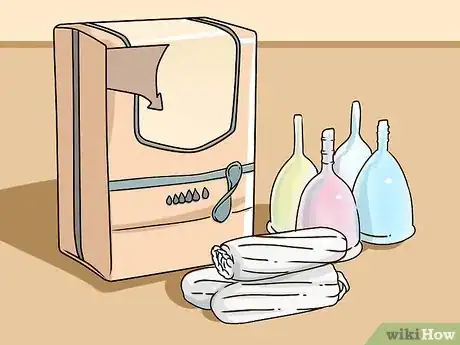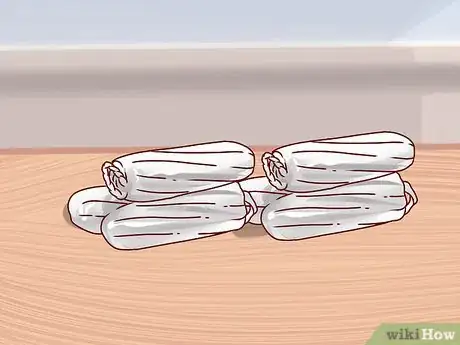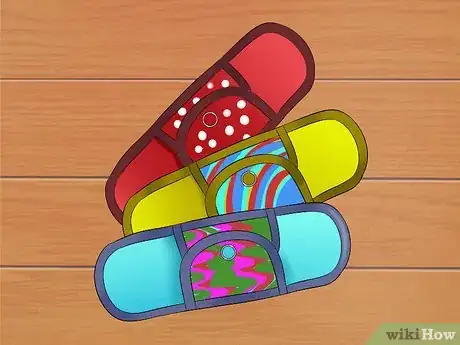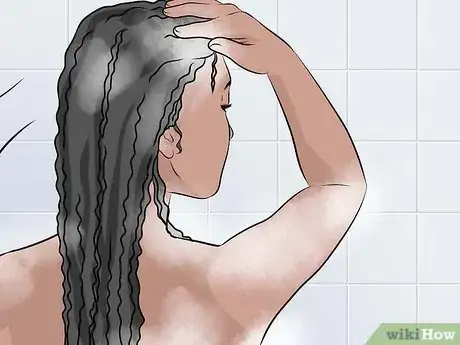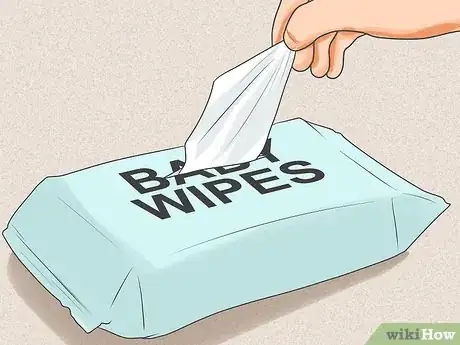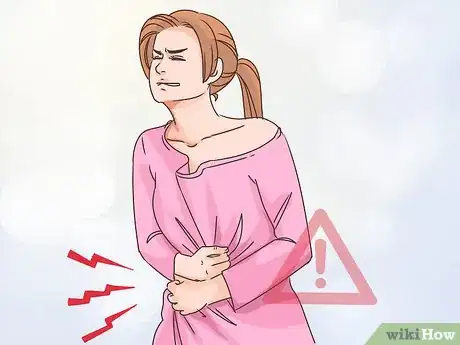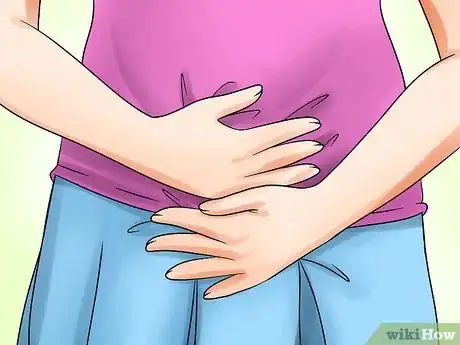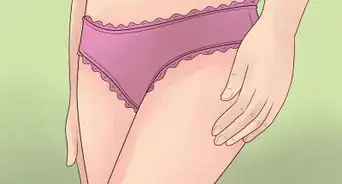This article was co-authored by Carrie Noriega, MD. Dr. Noriega is a Board Certified Obstetrician & Gynecologist and medical writer in Colorado. She specializes in women’s health, rheumatology, pulmonology, infectious disease, and gastroenterology. She received her MD from the Creighton School of Medicine in Omaha, Nebraska and completed her residency at the University of Missouri - Kansas City in 2005.
There are 8 references cited in this article, which can be found at the bottom of the page.
wikiHow marks an article as reader-approved once it receives enough positive feedback. This article received 16 testimonials and 83% of readers who voted found it helpful, earning it our reader-approved status.
This article has been viewed 532,786 times.
Many people feel self-conscious during their menstrual cycle, but menstruation is a natural process. Read on to learn about proper hygiene during your period to avoid feeling self-conscious.
Steps
Using the Proper Supplies
-
1Familiarize yourself with your options. There are many options for menstrual hygiene, so choose what works best for your lifestyle.
-
2Consider using tampons. Tampons are the most common menstrual hygiene product in America[1] because they are convenient and simple to use. A tampon is made of absorbent cotton and is worn inside the vagina to absorb menstrual fluid as it leaves the cervix. They are available in a variety of absorbencies including light, regular, heavy, and super to coincide with the days of your flow. Tampons are disposable and are thrown away after use, and must be changed at least every eight hours.
- Never wear a tampon longer than eight hours or wear one that is more absorbent than you need, as this can lead to a rare but serious condition called Toxic Shock Syndrome.
Advertisement -
3Try disposable pads. Disposable pads (also called sanitary towels or sanitary napkins) fit inside the underwear and come in various lengths and absorbencies. They are made of an absorbent material called cellulose and must be thrown away after use. Some people use them as back-up protection with tampons, and other people prefer pads because they are uncomfortable or have difficulty with inserting something in their vagina. Because they have a leak-proof plastic backing, disposable pads can trap smells more than most other hygiene options.
-
4Look into using cloth pads. Some people choose to purchase or make pads made of absorbent materials like cotton, Zorb, or microfiber. Cloth pads do not contain the same chemicals as disposable pads and do not have the same smell that many people notice when blood is absorbed by a disposable pad. They do require regular laundering and can be slightly bulkier than disposable pads.
-
5Invest in a menstrual cup. Menstrual cups are very popular in Europe and have recently begun gaining popularity among Americans. Some menstrual cups like Softcup are disposable and inserted like a diaphragm. Reusable menstrual cups like the DivaCup or Lunette are made of medical-grade silicon and are inserted into the vagina and worn against the opening of the cervix. In both cases, the muscles of the vagina wall hold the cup in place. They can be worn for 12 hours, including while in the water or while sleeping. Because they are worn internally, they can help reduce the smell of menstrual blood during your period.
- The user removes the cup every four to 12 hours, pours the collected blood into the toilet or sink, and washes the cup before reinserting.
-
6Change your tampon or pad regularly. Wearing a tampon for an extended time can lead to leaks, and wearing a pad for too long can lead to odors.
- During your heavy days, you may need to change it every hour or two. On light days, don't go more than three to four hours without changing it during the day.
- Again, never leave a tampon in for more than eight hours, even for overnight wear, and never wear a tampon that is a higher absorbency than you need to reduce your risk of TSS. [2]
-
7Be prepared. Your period will most likely be regular and predictable, but sometimes "breakthrough bleeding" can occur between periods, or your period can be early. It's best to be prepared with the right supplies at all times.
- Keep a tampon or pad with you in your purse, locker, and/or car for emergencies.
- Keep a supply of tampons or pads in your bathroom so that you won't have to run to the store when your period starts.
- Don't be afraid to ask a friend for a tampon or pad if you need one. Even a stranger in the bathroom will likely be willing to help you out if you are in need.
Keeping Your Body Clean
-
1Shower daily. Your entire body needs to be cleaned every day, and during your period you will need to take extra time to wash your vulva (the genital area on the outside of your body), as blood and fluids can build up in this area.
- Use a mild soap or body wash on your whole body, including your vulva, and rinse well.
- You do not need to use a special soap made for your genitals; these are a marketing gimmick meant to exploit your self-consciousness about your period. Remember, it is natural to have a body that smells like a body, and genitals that smell like genitals.
- You should never clean inside your vagina, such as with douches. Your vagina is a self-cleaning organ that naturally produces the right balance of mucus to flush out any contaminants, and a douche or wash can disrupt your pH balance and lead to infection.[3]
-
2Try baby wipes. If you feel you need extra freshening between showers, unscented baby wipes will help get rid of odor.
- Use the wipe as you would toilet paper after using the restroom, wiping only on the outside of your body. Be sure to discard it in the trash can, as they are not made to flush and can clog sewer lines.
- Baby wipes are made for an infant's sensitive skin, so they should not sting, but discontinue use if they burn, itch, sting, or you get an infection.
-
3Keep your underwear fresh. You can stay clean and avoid smells by changing these regularly and keeping an eye out for leaks.
- Wear cotton underwear. Cotton is a natural fiber that allows air to circulate properly, which can help prevent sweating and smells.
- You should also avoid wearing thongs during your period, which can transfer bacteria from your anus to your vagina and cause infections.[4]
- Change your underwear if they become damp with sweat or fluid, or at least once a day.
-
4Wash your clothes. Sometimes body odor intensifies during your period and can leave your clothing smelling musty.
- Use the recommended amount of detergent and be sure you wash everything, including your underwear, daily.
- If blood gets on your clothing or sheets, rinse with cold water as soon as possible and then rub with a laundry pre-treatment product such as Spray n Wash or Shout. Let it sit for a few hours to overnight, then wash on warm with your regular detergent.
Troubleshooting Smells
-
1Remember that most smells during your period are normal and not a cause for concern. In fact, other people most likely cannot smell you. Every person has a distinct vaginal smell during their period (and a different, distinct smell when they are not on their period), so it is important to determine if a smell is typical or abnormal for you.
- Blood has a normal, slightly metallic smell to it. This is normal, but if it bothers you, consider wearing tampons or menstrual cups, or changing your pad more frequently.
- If the smell is very strong, fishy, foul, or is otherwise abnormal for you, and you have been washing daily, there is probably an underlying cause.
- If you wear tampons and notice a strong odor, you may wish to check for a retained tampon. This occurs when you forget to remove your tampon, and the old tampon is still in your body. It is impossible for a tampon to get "lost" in your body, so if it's still in there, you should be able to locate and remove it easily. Insert a clean finger into your vagina and feel for the string, then pull it out. If you find you cannot remove it, see your doctor immediately.
-
2See your doctor to rule out infection. A fishy or foul smell that persists even when you clean regularly can indicate an infection called bacterial vaginosis (BV), which requires a prescription to treat.
- BV is sometimes accompanied by itching or burning, but other times there are no symptoms except a foul smell. You will need to see your doctor for a prescription to treat BV.[5]
-
3Check for body odor. Sometimes your hormones shift during your period, which can make your normal body odor smell stronger.
- While most people can use a regular deodorant during their period, others find that it is not sufficient.
- Both body odor and vaginal odor can be influenced by diet, and some foods like garlic, coffee, and fried foods are known to have an effect on the smell. If your diet contains any of these or other pungent foods, consider eliminating the food to see if the smell improves.
-
4Consider the weather. On very hot days, menstruation and sweat can combine to create a stronger smell than normal.
- This can be especially problematic if you tend to wear disposable pads, which trap bacteria, blood, and sweat between the layers of plastic. In this situation, consider wearing a tampon or menstrual cup, which is inside the body, or change your pad more frequently.
Understanding Menstruation
-
1Understand the onset of menstruation. Most people experience their first period around age 12.[6]
- Your first period usually comes about two years after the very first signs of puberty, which are usually breast buds (slightly swollen and protruding nipples, not actual breasts), and a few months after the first signs of armpit and pubic hair.[7]
- Your first period can start at any time but might be accompanied by sore breasts, mood swings, or pain in your lower abdominal muscles called cramps.
-
2Recognize that many people have to deal with menstrual hygiene. It should not be embarrassing or strange.
- The first time you get your period, you might feel worried or self-conscious. But look around. About half of the entire world's population has, used to have, or will have periods during their lives. It is one of the most normal human processes imaginable.
- Most people begin their period around age 12[8] and experience menopause around age 51,[9] which means that they will experience 39 years of monthly periods or about 468 total periods!
-
3Learn to recognize your body's signals. Every person's menstrual cycle is a bit different, but with time most people can learn to recognize their own cycle so that they can prepare for their period.
- A "menstrual cycle" actually refers to the entire fertility cycle, usually 28 days, that results in a period once a month. Every month, your body prepares to become pregnant. Over the course of the month, the body creates a nutrient dense lining for the womb to nourish a potential embryo, then releases an egg which travels down to the womb area, and if it is not fertilized by sexual intercourse, it leaves your body along with the lining of the womb, which appears as bloody fluids as it leaves through the vagina.
- As your body prepares for your period; you might experience general symptoms known as PMS (premenstrual syndrome), which can include bloating, tiredness, moodiness, food cravings, headaches, and cramps.
Warnings
- If you wear tampons, know the warning signs of Toxic Shock Syndrome. These include a sudden high fever, a rash that looks like a sunburn, low blood pressure/dizziness, and diarrhea. Remove your tampon and call for an ambulance if you experience these symptoms.⧼thumbs_response⧽
References
- ↑ http://www.healthywomen.org/content/article/tampons-pads-or-menstrual-cups-whats-right-you
- ↑ http://www.mayoclinic.org/diseases-conditions/toxic-shock-syndrome/basics/definition/con-20021326
- ↑ http://womenshealth.gov/publications/our-publications/fact-sheet/douching.html
- ↑ http://www.cosmopolitan.com/health-fitness/a39728/13-times-you-should-never-wear-a-thong/
- ↑ http://www.mayoclinic.org/diseases-conditions/bacterial-vaginosis/basics/tests-diagnosis/con-20035345
- ↑ http://www.obgyn.net/sexual-health/first-menstruation-average-age-and-physical-signs
- ↑ http://www.obgyn.net/sexual-health/first-menstruation-average-age-and-physical-signs
- ↑ http://www.obgyn.net/sexual-health/first-menstruation-average-age-and-physical-signs
- ↑ http://www.emedicinehealth.com/menopause/article_em.htm
About This Article
Just because you’re on your period doesn’t mean you have to be uncomfortable or worry about unpleasant odors, as there are a few simple things you can do to keep yourself feeling fresh. Use unscented baby wipes for a quick way to freshen up on the go. Shower every day using a mild soap to stay clean and hygienic. Also, remember to wear clean clothes and underwear to avoid body odors building up. If there are any fishy or foul-smelling odors associated with your period, seek medical advice. For more information about your period from our gynecologist co-author like recognizing your body’s signals, scroll down.
